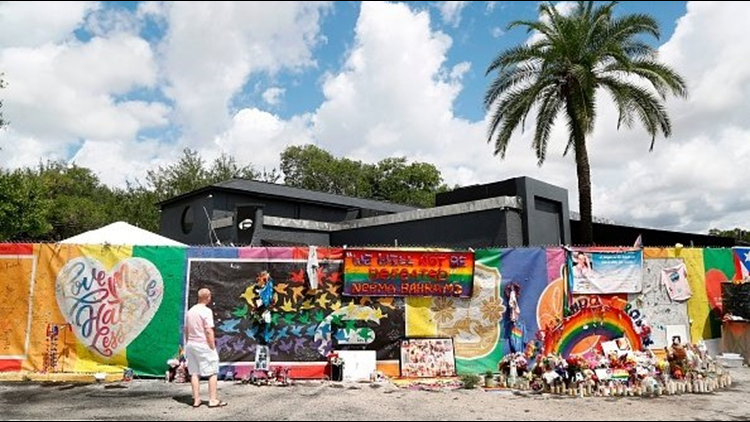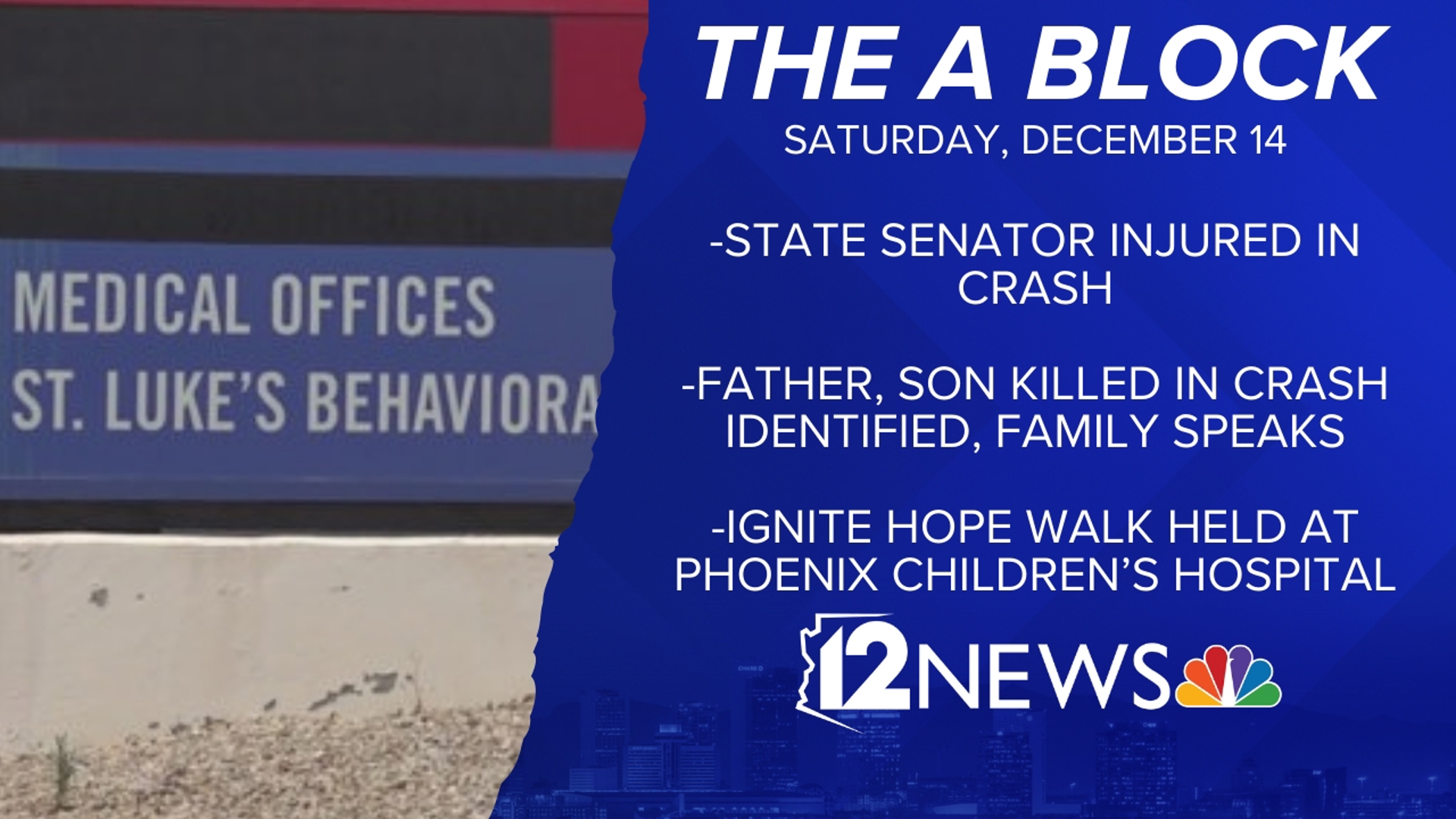ORLANDO, Fla. - Monday marks one year since the deadliest mass shooting in modern U.S. history.
Forty-nine people were killed and dozens injured in the Pulse nightclub shooting on June 12, 2016.
Below is a timeline of the events and its aftermath.
Mobile App Users: Click here to view this story
Timeline: Pulse Nightclub shooting
June 12, 2016
2:02 a.m.: A gunman walked into the Pulse nightclub with a military-style rifle. He headed for the dance floor while firing shots at random. An off-duty detective working security at the club called for help and tried to stop the gunman.
2:03 a.m.: Back-up began to arrive at Pulse. There was also another shootout.
2:08 a.m.: A team of law enforcement officers went inside of Pulse to start rescuing victims.
2:10 a.m.: A lieutenant cornered the gunman in one of the bathrooms inside Pulse.
2:21 a.m.: A hostage inside of the bathrooms called 911 said the gunman is reloading the rifle.
2:48 a.m.: An officer spoke with the gunman, who said he was wearing a bomb vest. For the next couple of hours, law enforcement worked to tear out windows and concrete walls to pull more people from the building.
5:15 a.m.: The gunman shot at SWAT members, who fire back and kill the gunman.
5:27 a.m.: The remaining survivors inside of the Pulse nightclub are rescued.
11:05 a.m.: A helmet helped save the life of an Orlando officer shot in the Pulse nightclub.
12:05 p.m.: Florida Gov. Rick Scott declared a state of emergency for Orange County and the city of Orlando.
2:51 p.m.: A look back on the history of attacks on gay clubs.
2:53 p.m.: Several politicians weighed in on the Orlando shootings, including presidential candidates Donald Trump and Hillary Clinton.
3:14 p.m.: Orlando police identify the gunman as Omar Mateen, who died in a shootout with SWAT members.
The remainder of June 12, 2016:
President Barack Obama called the Pulse nightclub attack, “the most deadly shooting in American history.”
June 13, 2016:
Orlando police began to release the identities of the people killed in the shooting. Orlando Mayor Buddy Dyer began confirmed 49 people were killed in the shooting.
President Obama again spoke on the shooting.
June 14, 2016:
Several regulars at Pulse said they had seen Mateen at the club before drinking, arguing and talking about his family.
A war veteran who also worked a bouncer at Pulse helped save dozens of lives during the shooting.
Another victim recalled his experience of what happened during the attack.
June 15, 2016:
The FBI checked Omar Mateen’s social media posts, and the role his wife Noor Salman played in the shooting. Law enforcement sources said there's surveillance video of Omar Mateen and his wife buying ammunition.
Several gay men also told investigators they’d seen Mateen at Pulse several times before the attack.
The Pulse owner and workers vowed to reopen the nightclub.
June 16, 2016:
President Obama spoke again, this time in Orlando, on the Pulse nightclub shooting.
Other nightclubs in Orlando began using metal detectors and had more security to help patrons feel safer after the shooting.
June 17, 2016:
The Tampa Bay Rays sold out Tropicana Field for Pride Night, which honored the victims of the Pulse shooting. The announced attendance of 40,135 fans was the first regular-season turnout of more than 40,000 at the Rays’ ballpark since opening day in 2006 against the Baltimore Orioles.
June 19, 2016:
An estimated 20,000 people gathered for a memorial at Lake Eola Park in Orlando one week after the Pulse nightclub shooting.
June 22, 2016:
Democratic presidential candidate Hillary Clinton paid her respects to the victims of the mass shooting. She laid flowers outside the memorial outside of Pulse nightclub.
June 23, 2016:
The owner of the Pulse nightclub held a street party to show that “Pulse is alive.” The nightclub remained closed at this time.
June 25, 2016:
As a memorial of those who lost their lives during the Orlando terror attack on Friday, Gov. Rick Scott directed 49 Florida state flags to be placed in front of the Florida Historic Capitol in Tallahassee for 49 days.
June 28, 2016:
A preliminary hearing laid out ground rules for another hearing on the fight between media companies and the city of Orlando over whether 911 calls from the mass shooting at a Florida nightclub could be made public.
June 30, 2016:
Emergency call logs released show that victims of the Pulse shooting in Orlando pleaded with sheriff's deputies and dispatchers to save them as they described losing their breath and feeling their bodies go numb from their wounds.
July 12, 2016:
The date marked one month since the Pulse nightclub shooting.
Forty-nine crosses made for the victims of the Pulse nightclub shooting were moved to the Orange County History Center.
July 13, 2016:
Law enforcement released the Pulse Nightclub in Orlando to its owner.
The Florida Department of Law Enforcement and the Orlando Police Department ended their control of the property.
The FBI and the FDLE’s investigation continued.
July 14, 2016:
July 15, 2016:
U.S. Rep. John Mica held a hearing on why federal authorities didn't deem terrorism as a high enough threat factor in Orlando for the region to receive federal money for preventing and responding to terrorist threats.
The Justice Department also said it would review the Orlando Police Department’s response to the Pulse shooting.
July 18, 2016:
New documents showed the gunman who killed 49 patrons at a Florida nightclub was repeatedly taunted for being Muslim in his job as a security guard at a Florida courthouse.
July 26, 2016:
Officials in central Florida said the cost of responding to last month's Pulse nightclub shooting by police officers, firefighters, hazmat crews and others came to more than $1.7 million.
Aug. 1, 2016:
The owners of the Pulse nightclub announced on Instagram that Pulse would reopen as a memorial.
A post shared by Pulse Orlando (@pulseorlando) on
Aug. 2, 2016:
A Lakeland man whose sister died in the Pulse nightclub shooting honored her memory with a Hugs Not Hate campaign.
Aug. 4, 2016:
Orlando Mayor Buddy Dyer said he wanted the city to purchase the Pulse nightclub and create a permanent memorial for the 49 people who were killed there during a June shooting.
The administrator of a $23 million fund of donations for survivors and family members of the shooting warned that squabbling over estate questions could be the biggest obstacle to distributing the money.
Aug. 25, 2016:
The Orlando Regional Medical Center and Florida Hospital decided not to bill the injured victims from the Pulse nightclub shooting.
Aug. 29, 2016:
It took two months for one family to visit the spot where their loved one was killed.
Sept. 6, 2016:
Nearly four months after the attack, the final victim of the shooting at the Pulse nightclub left the Orlando Regional Medical Center.
Sept. 12, 2016:
An overnight fire destroyed the Islamic Center of Fort Pierce, a mosque once attended by the Pulse nightclub killer and another American terrorist.
Oct. 21, 2016:
A mural on the side of Pulse Nightclub #wtsp Story @ 6 #OrlandoStrong pic.twitter.com/tEwPMajzz7
— Isabel Mascarenas (@IMascarenas) June 6, 2017
March 25, 2017:
The third annual Tampa Pride Parade in Ybor City honored the victims of the Pulse nightclub shooting.
March 26, 2017:
A judge said a lawsuit brought by victims of the Orlando nightclub massacre against the gunman's employer and wife may be tossed out of federal court.
April 12, 2017:
Before a federal judge, Noor Salman's attorney Fritz Scheller,submitted his client’s not guilty plea. Salman faced charges of aiding and abetting by providing material support to a terrorist organization and obstruction of justice. Salman’s husband Omar Mateen was the gunman in the Pulse nightclub shooting.
April 14, 2017:
A report from Orlando police revealed nearly half of the 49 victims in the Pulse nightclub attack died on the dance floor without a chance to react or run for help.
May 1, 2017:
Valencia College raised more than $25,000 for an endowment honoring victims of the Pulse nightclub shooting.
May 4, 2017:
Barbara Poma, the owner of the Pulse nightclub, said the OnePulse Foundation and a task force would come up with the idea for a memorial to the worst mass shooting in modern U.S. history.
Poma visited the memorials in Oklahoma City and New York City, and talked to their creators for input. The community also had chance to offer ideas.
May 12, 2017:
Pulse survivor Amanda Grau shared a lesson she learned from the June 2016 shooting. 10Investigates found some clubs quickly lapsed into complacency with potentially fatal mistakes such as blocking emergency exit routes.
June 1, 2017:
Hours of body cam footage shows the chaos and horror officers encountered as they responded to the June 2016 Pulse nightclub shooting in Florida.
Survivors of the Pulse nightclub shooting were given no advance warning the new bodycam footage was going to be released, the leader of a gay and lesbian community center said.
June 5, 2017:
Pulse nightclub survivor Norman Casiano shared his story of the fatal shooting.
June 6, 2017:
A Pulse victim's family member spoke out about the loss of her cousin Eddie Sotomayor.
June 7, 2017:
A Sarasota couple added the names of the victims of the Pulse nightclub shooting to their car.
June 9, 2017:
Pulse nightclub survivor and Tampa native Amanda Grau threw out the ceremonial first pitch at the Tampa Bay Rays’ Pride Night. Grau survived despite multiple gunshot wounds from the attack.
June 10, 2017:
The City of Tampa released a video tribute to Orlando three days before the one-year mark of the Pulse nightclub shooting.
The 30-second video entitled "Dear Orlando" appeared on the city of Tampa's YouTube page.



